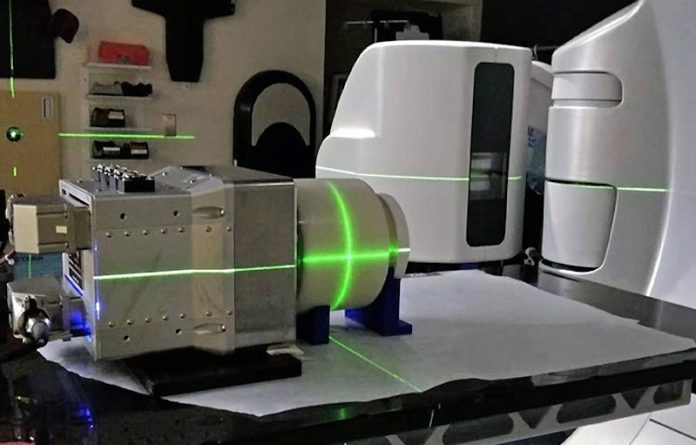
In a study from the University of Michigan, scientists found radiation that used to treat half of all cancer patients can be measured during treatment for the first time with precise 3D imaging.
Doctors can capture and amplify tiny sound waves created when X-rays heat tissues in the body, and they can map the radiation dose within the body, giving them new data to guide treatments in real-time.
This could lead to safer, more effective cancer therapy.
Radiation is used in treatment for hundreds of thousands of cancer patients each year, bombarding an area of the body with high-energy waves and particles, usually X-rays.
The radiation can kill cancer cells outright or damage them so that they can’t spread.
These benefits are undermined by a lack of precision, as radiation treatment often kills and damages healthy cells in the areas surrounding a tumor. It can also raise the risk of developing new cancers.
With real-time 3D imaging, doctors can more accurately direct the radiation toward cancerous cells and limit the exposure of adjacent tissues. To do that, they simply need to “listen.”
When X-rays are absorbed by tissues in the body, they are turned into thermal energy. That heating causes the tissue to expand rapidly, and that expansion creates a sound wave.
The acoustic wave is weak and usually undetectable by typical ultrasound technology.
In the study, the new ionizing radiation acoustic imaging system detects the wave with an array of ultrasonic transducers positioned on the patient’s side.
The signal is amplified and then transferred into an ultrasound device for image reconstruction.
With the images in hand, an oncology clinic can alter the level or trajectory of radiation during the process to ensure safer and more effective treatments.
The team says in the future, doctors could use imaging information to compensate for uncertainties that arise from positioning, organ motion, and anatomical variation during radiation therapy.
That would allow doctors to deliver the dose to the cancer tumor with pinpoint accuracy.
If you care about cancer, please read studies that a low-carb diet could increase overall cancer risk, and vitamin D supplements could strongly reduce cancer death.
For more information about nutrition, please see recent studies about meat and cheeses directly linked to higher cancer risk, and results showing this anti-inflammatory drug could help stop the spread of cancer.
The study was conducted by Xueding Wang et al and published in Nature Biotechnology.
Copyright © 2023 Knowridge Science Report. All rights reserved.



